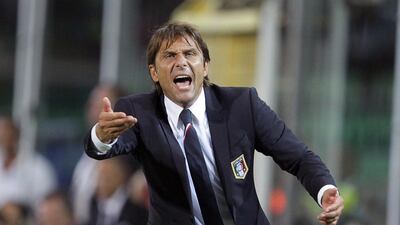Antonio Conte would look good in a blue Chelsea tracksuit, or Puffa jacket, or whichever item from the corporate kitbag he chooses to wear if he becomes, as seems likely, the next manager of the London club.
Their colours match his piercing eyes, Conte’s most striking physical feature when you first meet him.
Chelsea executives have seen his steely gaze up close, and are reliably reported to have been impressed with the current coach of the Italy national team, with his record in an Azzurri tracksuit – Italy have been unbeaten in all but one of their 18 games – and especially by his work in his previous job, which can be likened to some of the demands at Chelsea.
At Juventus, where Conte had played for much of his career as a industrious midfielder, he took over a club which had fallen into a condition well short of where their status and history suggested they should be.
He led a spirited, rapid revival after a period of turmoil.
Read more:
Conte ‘agreement’ with Chelsea? Not quite so clear – Simeone and Allegri still in mix
Juventus ‘have taken one of our direct rivals for the title out of the race’ with Inter win
By 2011, prior to him taking over as Juve coach, the club had been managed by four different men in just over two years, the sort of turnover even Chelsea might regard as scattergun.
He was still relatively young, at 41, but had worked his way up the coaching ranks with smaller clubs. He had strong backing.
“He is what Juventus needed,” said Marcello Lippi, who had managed Conte as a Juve player. “He’s well-organised, tactically mature and he has a bit of rage.”
Juve’s players knew that as soon as he entered the dressing room.
Some there had weathered a season in Serie B, to which Juve had been demoted following the 2006 Calciopoli scandal, and became impatient for former glories, for long European campaigns and more league titles.
“He is tough,” Alex del Piero, one of the veterans whom Conte needed to manage carefully, said, appreciating his importance while keeping an eye on the need to refresh the squad.
Conte won the league title in his first full season. To claim he did so in extravagant style would be contested. Juventus drew an unusually high proportion of their matches. But they were formidably, epically hard to beat: No opponent could do so for the entirety of that first league campaign.
He won the next scudetto – and the one after that. The template he had built, with a flexible formation that often started with three at the back and a pair of adventurous wing-backs, would add a little more flair as Juve grew in confidence.
He instilled a defiant spirit, too, that may have been second-nature to a man who had played at the Juventus of the 1990s.
“That was some dressing room, hard to the point of brutality,” Carlo Ancelotti, who coached Juventus in between Lippi’s dominant spells, said.
“It had a roster of bad boys.”
Ancelotti listed them: Paulo Montero, the Uruguayan defender; Ciro Ferrara, his Neapolitan partner in a granite back four; Zinedine Zidane. Top of the list? Conte.
Andrea Pirlo, the midfielder whom Conte welcomed to Juventus in 2012, noted his siege-mentality motivational techniques,. He would display unfavourable newspaper articles to cultivate indignation among the players.
His own fuse could be short – on the touchline and with his board.
He resigned to very quickly take up the Italy post in the close-season of 2014 after disagreements over recruitment.
He had become concerned at Juve’s inability to make the similar progress in the Uefa Champions League they had done in Serie A.
He has some blemishes on his record including a long ban imposed on him while at Juventus in 2012 after he was found to have not reported an attempt at match-fixing while coach of Siena, a charge he strenuously denied.
The suspension meant he had to watch matches from executive boxes, or broadcast booths, prowling about them like a caged predator.
It was thus constrained that he first came to Stamford Bridge as an opponent.
He issued enough good advice from his restricted position to help knock Chelsea out of the Champions League in the group phase that season, and, evidently, to leave some of the Blue VIPs begrudgingly respectful of the Juve he had inspired and energised.
sports@thenational.ae
Follow us on Twitter @NatSportUAE
Like us on Facebook at facebook.com/TheNationalSport


